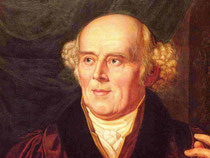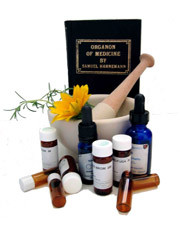Homeopathic Medicine

"The physician's highest calling, his only calling, is to make sick people healthy --- to heal --- as it is termed. The highest ideal of therapy is to restore health rapidly, gently, permanently; to remove and destroy the whole disease in the shortest, surest, least harmful way, according to clearly comprehensible principles."
– Samuel Hahnemann, Father of Homeopathy, Organon of Medicine, 1810.
What Is Homeopathy?
Homeopathy is a complete system of natural medicine that has been in worldwide use for over 200 years. It is a profoundly effective, safe and gentle system of healing which works by stimulating the body’s natural ability to heal itself. It will not just drive away the symptoms but addresses the cause of the illness. It views the illness as more spiritual in nature, much as Chinese and India’s Ayurvedic medicine espouses the idea that illness results from an imbalance within the body.
Homeopathy is a holistic medicine as it addresses the whole person on mental, emotional and physical levels. It sees all symptoms of illness as expressions of disharmony within the whole person and recognizes that it is the individual who needs treatment, not only the disease. For establishing the balance in the body, an internal single remedy for the whole person will be needed, rather than a number of different remedies for each ailment.
Homeopathic concepts have existed for thousands of years but it was the German doctor Samuel Hahnemann, who in the 18th century first made these concepts into a comprehensive system of healing principles and practices. The most fundamental of these principles is the Law of Similars or ‘like cures like’. The Law of Similars states that the symptoms that a substance causes in a healthy individual are the symptoms that the same substance in a small dose can remove in a person’s ill state of health.
Take onion, for example. We know that when cutting a strong onion we often experience a discharge from nose, a particular soreness in the throat and stinging, runny eyes. A homeopath will advise Allium cepa (the homeopathic remedy made from onion) for the patient who has these particular symptoms.
The Homeopathic Consultation
A session with a homeopathic practitioner is a unique experience for someone accustomed to conventional medicine.
During the homeopathic consultation you will be asked to talk not only about your complaints, but also about the individual way in which you experience them, your reactions to them and how they affect your life. As the homeopath sees every health problem as a mind-body process, your personality traits are as important as your physical well-being.
The Homeopathic Remedies

Homeopathic remedies are non-toxic, non-habit forming, free from side effects and gentle in their action. They are easy to take and pleasant to the taste.
The homeopathic remedy acts as a signal, which stimulates body’s self-healing powers, mobilizing the defense systems and working on the mental, emotional and physical aspect of the body.
Homeopathic remedies may be recommended in a number of different strengths, or potencies, as they are called, and in different ways. The homeopath chooses the method to suit the individual and the nature of the health challenge.
The Potential of Homeopathy
Homeopathy has been used by people worldwide. It has enjoyed the patronage of the British royal family for the past four generations. It is particularly effective in helping people with chronic symptoms that fail to respond to conventional treatment.
People who have been receiving homeopathic care generally find that their state of health and well-being has improved. They are better to resist infection and have a greater sense of stability and individual purpose in life.
The long-term benefit of homeopathy is that it not only ameliorates the presenting symptoms but it reestablishes internal order at the deepest levels and thereby provides a lasting health improvement.
Where Homeopathy has Proven Effective
Homeopathy can be used in first aid situations or acute health problems, which don't require a medical doctor's intervention, or long-term chronic conditions, as well as emotional problems, obstetrical and pediatric conditions. It also can be extremely useful as a preventive medicine for constitutional strengthening. Homeopathy is also safe to use during pregnancy, for infants and the elderly.
In all cases, the remedy is selected on the totality of the symptoms one expresses, along with the uniqueness of each personality and the information one gives to the homeopath.
Acute Conditions
In acute conditions, such as minor burns, skin irritations, insect stings or bites, teething or tooth pain, homeopathy can speeds up and assist in the recovery process.
Chronic Conditions
Since homeopathy treats the person, not the disease, even in advanced cases, where curative treatment isn’t possible, homeopathic remedies may prove effective in improving quality of life.
Constitutional Strengthening
In this category, the person’s goal is the improvement or strengthening of his or her general overall health. Homeopathic care on a constitutional level can boost the weak constitution and decrease its susceptibility to illness.
History of Homeopathy
Over 200 years ago, a German physician, Dr. Samuel Hahnemann (1755-1843), developed a system of medical treatment called Homeopathy. Based on his observations and experiments, he formulated the Principle of Similarity, which states that substances which cause reactions in a healthy body or mind can be used in an extremely diluted form to address the same reactions, which are part of the process of being unwell. He devoted his life to developing this system, in part by performing Provings, in which healthy humans are given small experimental doses of the homeopathic substance to gauge the effects. Hahnemann proved almost every remedy of his time on himself while he was alive.
In 1810, Dr. Hahnemann published the first edition of the Organon. Five more editions appeared during his lifetime; the sixth was written in 1842 and published posthumously. Even today, every serious study of homeopathy begins with the Organon. The most advanced homeopaths base their practice on the 6th Organon. See FAQs.
History of Homeopathy in the States
In 1825, several physicians who had studied in Europe brought homeopathy to the United States. Soon, other doctors followed their lead. By the mid-1800's, several medical colleges taught homeopathy, growing to 22 within a few decades. Faced with a popular rival, the medical establishment soon drove homeopathy into the background. By the 1940s, homeopathy was no longer officially taught in the U.S.
In recent decades, homeopathy has enjoyed a resurgence. Physicians don’t have treatments for many diseases. Some patients find homeopathy when forced out of the medical world. Others seek more holistic approaches to healing or don’t want the side effects of drug therapy, a common western way of suppressing symptoms.
Principles of Homeopathy
Samuel Hahnemann's revolutionary system of healing is based on the four fundamental principles:
• the law of similars
• the single remedy,
• the minimal dose, and
• the potentized remedy
The Law of Similars
The total picture of the patient should be as similar as possible to the symptom picture of the selected remedy. This is known as “similia similibus curentur” or “likes cure likes.” This principle states that any remedy that has power to derange your health also can restore it – if customized to fit the individual. That is why the same health challenge in two patients may call for two different remedies.
The Single Remedy
"Unitary" or, more often termed, “classical” homeopathy means that only one remedy is given at a time, because only one remedy can correspond properly to a patient’s complete condition. A prescription that doesn’t aim for this totality isn’t homeopathic. Homeopathy is based on provings, and there have never been provings done on a combination remedy.
The Minimal Dose
Remedies are diluted to extremely small or infinitesimal doses. That’s because in homeopathy, less is more. This also allows almost any substance to be used as a remedie without any side effects. Homeopathic remedies are thought to work on a deep plane and resonate with the body, triggering a positive healing response from the person’s own vital force.
The Potentized Remedy
Disease occurs on an energetic level. So does homeopathy. All remedies undergo a process to increase their healing energy — first, dilution of ingredients, then a vigorous shaking (succussion). It is believed that when a remedy is succussed or shaken vigorously, the water molecules take on a photographic memory of the original substance. The more a remedy is diluted, the stronger its ability to stimulate healing becomes.
Other useful principles of homeopathy to understand:
Aggravation
A carefully chosen homeopathic remedy stimulates the body’s healing process. The idea is to gently encourage the movement toward health. A remedy that is too strong or given too often can result in an aggravation, where symptoms are temporarily intensified. While some homeopaths believe an aggravation is necessary to procure a healing, this isn’t so. However, aggravations are sometimes unavoidable, if there have been many years of suppression of symptoms with western medications.
Individualization
A homeopathic remedy must be customized to fit the individual's state of imbalance, an approach called "individualization." The totality of the symptoms gathered -- physical, emotional and mental -- will guide the homeopath to the correct choice of the homeopathic remedy.
Provings
Each homeopathic remedy is first tested in healthy volunteers and their symptoms recorded to develop a complete profile of the remedy. Such trials are known as "provings." Since all remedies have been proved before used, we can predict the kind of symptoms they will correct in advance. This is one of the great things about homeopathy.
Vital Force
According to homeopathic thinking, an ill health originates from a disturbance of the patient’s "vital force." This is the essential energy that sustains life. Homeopathic remedies seek to restore balance and fundamental strength to the life force.
Homeopathy not only restore and maintain health but it can also prevent illness. It can correct imbalances long before the appearance of the more serious symptoms, which denote a particular disease.


